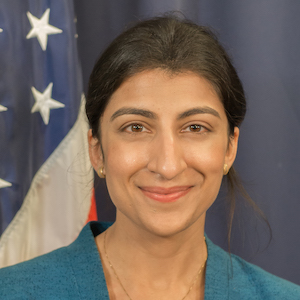Dallas-based global tax services and software provider Ryan has filed a lawsuit in federal court challenging the Federal Trade Commission’s new non-compete rule. It’s the first challenge filed against the rule, which “would upend companies’ IP protections and talent development and retention by invalidating millions of employment contracts and nullifying the laws of dozens of states, according to the FTC’s own public estimation,” Ryan said.
Filed in the U.S. District Court for the Northern District of Texas, the lawsuit says the new rule “imposes an extraordinary burden on businesses seeking to protect their intellectual property and retain top talent within the professional services industries.” Ryan is seeking to prevent “the immense, undue burdens the FTC’s rule would impose on service-driven companies of every size nationwide.”
FTC rule aims ‘to promote competition by banning noncompetes nationwide’

FTC Chair Lina Khan [Photo: Casmoe Photography via FTC.gov]
On Tuesday, the FTC announced it had issued a final rule “to promote competition by banning non-competes nationwide, protecting the fundamental freedom of workers to change jobs, increasing innovation, and fostering new business formation.”
Non-competes are “a widespread and often exploitative practice imposing contractual conditions that prevent workers from taking a new job or starting a new business,” the FTC said, often forcing workers “to either stay in a job they want to leave or bear other significant harms and costs, such as being forced to switch to a lower-paying field, being forced to relocate, being forced to leave the workforce altogether, or being forced to defend against expensive litigation.”
An estimated 30 million workers—nearly one in five Americans—are subject to a non-compete clause, the FTC noted.
“Non-compete clauses keep wages low, suppress new ideas, and rob the American economy of dynamism, including from the more than 8,500 new startups that would be created a year once noncompetes are banned,” FTC Chair Lina Khan said in a statement. “The FTC’s final rule to ban non-competes will ensure Americans have the freedom to pursue a new job, start a new business, or bring a new idea to market.”
The FTC estimates that the final rule banning non-competes “will lead to new business formation growing by 2.7% per year, resulting in more than 8,500 additional new businesses created each year.” The commission says the rule “is expected to result in higher earnings for workers, with estimated earnings increasing for the average worker by an additional $524 per year, and it is expected to lower health care costs by up to $194 billion over the next decade. In addition, the final rule is expected to help drive innovation, leading to an estimated average increase of 17,000 to 29,000 more patents each year for the next 10 years under the final rule.”
Ryan emphasizes companies’ ‘proprietary formulas for success’
Ryan takes a very different view on the rule—right from the top.
“For more than three decades, Ryan has served as a champion for empowering business leaders to reinvest the tax savings our firm has recovered to transform their businesses,” the firm’s Chairman and CEO, G. Brint Ryan, said in a statement.. “Just as Ryan ensures companies pay only the tax they owe, we stand firm in our commitment to serve the rightful interest of every company to retain its proprietary formulas for success taught in good faith to its own employees.”
Last spring, Ryan “sought to dissuade” the FTC from imposing the new rule by submitting a 54-page public comment against it. In the comment, Ryan called non-compete agreements “an important tool for firms to protect their IP and foster innovation,” saying that without them, firms could hire away a competitor’s employees just to gain insights into their competitor’s intellectual property. Ryan added that the rule would inhibit firms from investing in that IP in the first place, “resulting in a less innovative economy.”
The firm’s lawsuit contends that the FTC lacks the authority to prohibit non-compete agreements. It also argues that the FTC itself is unconstitutionally structured.
Ryan points to ‘benefits’ of non-compete clauses
“Among other benefits, non-compete agreements incentivize companies to invest in research and development, empower collaborative work environments, and instill a commitment to aiding personnel growth and development,” the Dallas-based firm said in a statement. “Non-compete agreements also promote worker training, increasing their earnings, by solving a free-rider problem that inhibits firms from investing in their employees. These arrangements, mutually agreed upon by the employer and employee, enable all parties to maximize their output in an open and dynamic work environment. Innovation fueled by collaboration is critical to the modern economy.”
John Smith, Ryan’s chief legal officer and general counsel, said the FTC is going against precedent by issuing today’s final rule.
“Upending a long history of evaluating non-compete agreements through case-by-case analysis, the commission instead has bluntly struck at nearly all existing agreements,” Smith said in a statement. “With history, logic, law, and the constitution on our side, we look forward to righting this wrong by the FTC against employees and employers alike.”
Ryan has engaged Gene Scalia, a former U.S. Secretary of Labor, and his team at L.A.-headquartered international law firmi Gibson, Dunn & Crutcher LLP “to challenge together the FTC’s new rule.” Gibson, Dunn & Crutcher has an office in Dallas.
![]()
Get on the list.
Dallas Innovates, every day.
Sign up to keep your eye on what’s new and next in Dallas-Fort Worth, every day.




























